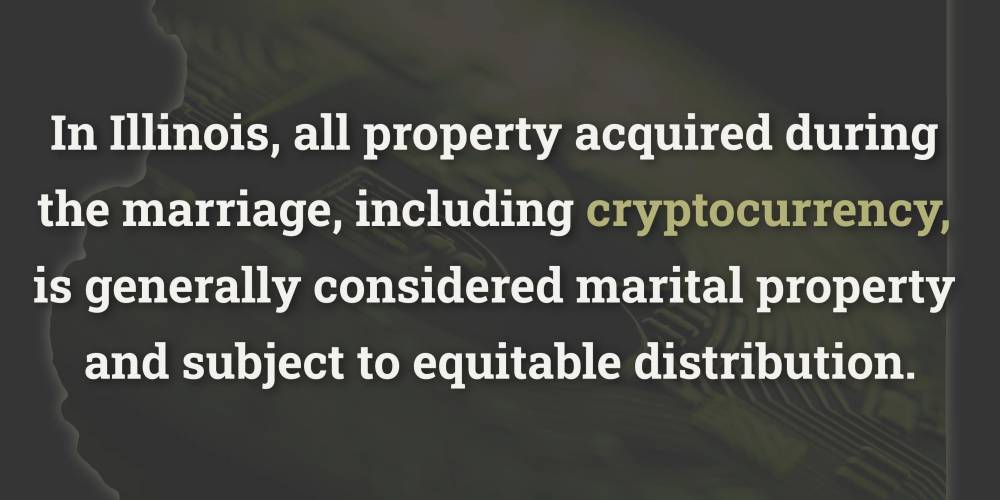630-462-9500
After Hour New Client Telephone Number 630-690-6077
1776 S. Naperville Road, Building B, Suite 202,
Wheaton, IL 60189
What to Know About Cryptocurrency and Divorce
 As the popularity of cryptocurrency continues to rise, it increasingly becomes a factor in divorce proceedings. Cryptocurrency is mainstream now rather than the niche financial asset it began as. In 2024, the global ownership of cryptocurrencies totaled 420 million people. Ethereum and Bitcoin continue to dominate the cryptocurrency market.
As the popularity of cryptocurrency continues to rise, it increasingly becomes a factor in divorce proceedings. Cryptocurrency is mainstream now rather than the niche financial asset it began as. In 2024, the global ownership of cryptocurrencies totaled 420 million people. Ethereum and Bitcoin continue to dominate the cryptocurrency market.
For couples in Illinois, understanding how cryptocurrencies are treated during a divorce can significantly impact asset division and financial settlements. The new administration enacted crypto-related orders on day one, and as digital currencies become increasingly common, their presence in the distribution of marital assets during divorce has grown significantly.
Dividing cryptocurrency during a divorce presents its own set of challenges that are both distinct and more complex than those associated with traditional marital assets. If cryptocurrency is a factor in your divorce, discuss with an experienced Wheaton, IL family law attorney what implications it may have on your divorce proceedings. Your lawyer will be able to provide clear insights for individuals facing a divorce involving cryptocurrencies.
Is Cryptocurrency Marital Property?
In Illinois, all property acquired during the marriage, including cryptocurrency, is generally considered marital property and subject to equitable distribution. This means any Bitcoin, Ethereum, or other digital assets obtained during the marriage may be divided between spouses. Under equitable distribution, it does not necessarily matter which spouse acquired the cryptocurrency, just that it was acquired during the marriage.
If either spouse owned cryptocurrency prior to the marriage, in most cases, it remains separate property. If the spouse who owned the cryptocurrency places his or her spouse on the account, then the cryptocurrency ceases to be a separate asset and becomes a marital asset.
If marital funds are used to add to the cryptocurrency account, then at least a portion of the account is marital property to be split during the divorce. However, determining the exact value of these assets can be challenging due to the volatility of the cryptocurrency market.
The value of cryptocurrency can change quickly and dramatically. In this way, it is significantly different from a regular bank account or investment portfolio. Plus, since cryptocurrency is often stored in private digital wallets, it can be harder for the other spouse to locate, even if it is marital property.
It is essential to determine precisely when and how the cryptocurrency was acquired to determine whether it qualifies as marital property or separate property. Cryptocurrency may be divided directly, with each spouse receiving a portion based on the current value. One spouse may retain the full value of cryptocurrency assets while the other receives a larger share of other marital assets.
However, the cryptocurrency could be at an all-time low or high at the time of division, which means there is always the possibility that one spouse ends up with fewer marital assets. One spouse could buy out the other’s share of cryptocurrency assets by transferring other assets of equal value, but again, the value of the cryptocurrency on the date of division could change drastically within a day or a week.
The Disclosure and Discovery of Digital Assets
As noted, one of the most significant hurdles in divorces involving cryptocurrency is ensuring both parties fully disclose their assets. Unlike traditional bank accounts or investments, cryptocurrency can be more challenging to trace, especially if one spouse is deliberately attempting to conceal assets.
Illinois law requires both spouses to provide a complete and honest disclosure of their financial information during the divorce process. If you suspect that your spouse may be hiding assets, you may need to work with a forensic accountant specializing in digital currencies to uncover such information.
Challenges and Strategies for Valuing Cryptocurrency
Valuing cryptocurrency can be particularly complicated due to its fluctuating market prices. When dividing marital property that includes cryptocurrency, both parties must agree on the valuation date and method. The date of the cryptocurrency valuation is critical. Courts typically use the date of filing or the date of the divorce trial to determine the value of marital assets. Since cryptocurrency can fluctuate so radically, extra considerations may need to be made.
It may be beneficial to consult with a financial professional who can provide insight into average market values, historical trends, and the potential for future appreciation or depreciation. Properly documenting the value of these assets at the time of divorce can ensure a fair division and help avoid future conflicts. Tracking ownership of cryptocurrencies can also be challenging since they may be stored in blockchain platforms or digital wallets, making it more difficult to identify and verify.

Considering Tax Implications of Cryptocurrency
Finally, it is crucial to understand the tax implications associated with cryptocurrency in a divorce. Transferring cryptocurrencies between spouses can trigger capital gains taxes, depending on the value at the time of transfer. Consulting with a tax professional who understands the nuances of cryptocurrency is vital to avoid unexpected tax liabilities and to make informed decisions regarding asset division.
Cryptocurrency Tips for Divorcing Couples
Unlike traditional financial assets, cryptocurrency brings unique considerations as a result of its digital nature. These tips can help ensure an equitable distribution and a smoother overall process:
- Ensure all documentation relating to cryptocurrency assets is in one place. Transaction purchase receipts, wallet addresses, and transfer records will all be necessary.
- Consider working with forensic accountants to ensure the valuation of the cryptocurrency is accurate.
- Plan for any tax implications associated with transferring or cashing out cryptocurrency during the divorce.
- Make sure both spouses disclose any cryptocurrency holdings. Failing to engage in complete financial transparency can result in adverse legal consequences.
- Seek help from a family law attorney who has a solid understanding of the complexities associated with cryptocurrencies.
How Could Cryptocurrency Complicate Spousal Maintenance and Child Support?
Since cryptocurrency values can fluctuate so drastically during a relatively short period of time, it is especially important to establish a valuation date while still considering the potential for future growth or decline. Cryptocurrency holdings impact income and financial resources. This means if one spouse is receiving income from cryptocurrency mining or investments, it must be disclosed as income to be considered during spousal support calculations and child support calculations.
Contact a DuPage County, IL Divorce Attorney
Given the complexities surrounding cryptocurrency and divorce, it is hugely important for individuals in Illinois to seek professional legal and financial guidance. Our firm is one of the most prestigious in the area. As a large firm with serious experience, we can offer our clients every resource necessary for the best outcome. If cryptocurrency is relevant to your divorce, contact the Wheaton, IL divorce lawyers with The Stogsdill Law Firm, P.C.. Call 630-462-9500 for a private consultation.




















